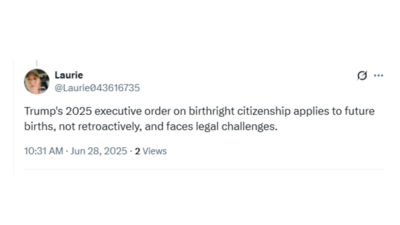ARTICLE AD BOX

In a significant legal victory for Donald Trump, the Supreme Court has curtailed the power of federal judges to issue nationwide injunctions. This decision potentially clears the path for Trump's controversial executive order targeting birthright citizenship, which seeks to deny citizenship to children born in the U.S. to undocumented immigrants.
So here’s what just happened—and why everyone’s talking about Trump, the Supreme Court, and birthright citizenship.In a major legal victory for Donald Trump, the U.S. Supreme Court ruled that federal judges can no longer issue nationwide injunctions.
That might sound like boring legal stuff, but here’s the twist: this decision paves the way for Trump’s controversial executive order that targets birthright citizenship.Quick refresher: birthright citizenship means if you're born on U.S. soil, you're automatically a citizen—no matter your parents' immigration status. It’s based on the 14th Amendment and has been the law of the land for over 100 years. Trump, during his presidency and again on the campaign trail, has repeatedly claimed that this policy encourages illegal immigration, and he’s vowed to end it.His latest executive order aims to deny citizenship to babies born in the U.S. to undocumented immigrants. But lower courts had blocked this move, thanks to a legal tool called a “universal injunction”—which allows one judge to pause a federal policy for the entire country. That’s now off the table.With the Supreme Court ruling, those nationwide blocks are gone, and federal judges can only issue decisions that apply to the plaintiffs in the case—not the whole country.
Translation? Trump’s order can now go into effect in many states, unless local courts say otherwise.This doesn’t mean birthright citizenship is completely over—it’s still protected under the Constitution. But the ruling makes it harder to challenge federal policies like this on a national scale. Now, states may enforce or reject Trump’s order individually, which could create a patchwork of citizenship rules depending on where you’re born.Unsurprisingly, the ruling sparked a firestorm online. Trump supporters are celebrating the win as a strike against judicial overreach. Critics, on the other hand, are calling it an attack on constitutional rights and a dangerous step toward discrimination."Trump's 2025 executive order on birthright citizenship applies to future births, not retroactively, and faces legal challenges."

"Revoking birthright citizenship risks creating a stateless underclass, denying rights to those born on U.S. soil. It fuels division, undermines equality, and opens the door to arbitrary discrimination. #CitizenshipMatters #ProtectThe14th"

"This is a slippery slope. Say it is amended. Do those with birthright citizenship get retroactively deported? What’s the age cut off then? What if only 1 parent is a citizen?"




.png)
.png)
.png)
















 4 hours ago
5
4 hours ago
5









 English (US) ·
English (US) ·